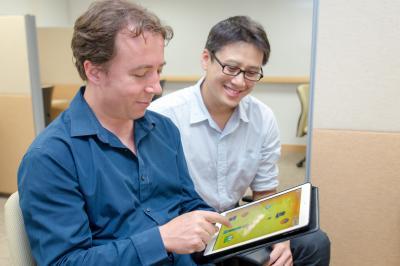Mental fitness tools are all the rage. Companies are pushing out various brain games that claim they can boost cognitive powers. Do they work? Most studies say no but a new paper finds that playing a puzzle game like Cut the Rope for as little as an hour a day led to improved executive functions.
Executive functions in the brain are important for making decisions in everyday life when you have to deal with sudden changes in your environment – better known as thinking on your feet. An example would be when the traffic light turns amber and a driver has to decide in an instant if he will be able to brake in time or if it is safer to travel across the intersection.

Assistant Professor Michael Patterson (left) and Ph.D. student Adam Oei, playing Cut the Rope on the tablet, which has shown to improve executive functions in its players. Credit: Nanyang Technological University
The new study tested four different games for the mobile platform, as their previous research had shown that different games trained different skills. The games were varied; a first person shooter (Modern Combat); arcade (Fruit Ninja); real-time strategy (StarFront Collision); and a complex puzzle (Cut the Rope).
Nanyang Technological University
undergraduates who were non-gamers were selected to play an hour a day, 5 days a week on their iPhone or iPod Touch. This video game training lasted for 4 weeks, a total of 20 hours.
Assistant Professor Michael D. Patterson said students who played Cut the Rope showed significant improvement on executive function tasks while no significant improvements were observed in those playing the other three games.
"This finding is important because previously, no video games have demonstrated this type of broad improvement to executive functions, which are important for general intelligence, dealing with new situations and managing multitasking," said Patterson.
"This indicates that while some games may help to improve mental abilities, not all games give you the same effect. To improve the specific ability you are looking for, you need to play the right game," added PhD student Adam Oei.
The abilities tested in this study included how fast the players can switch tasks (an indicator of mental flexibility); how fast can the players adapt to a new situation instead of relying on the same strategy (the ability to inhibit prepotent or predominant responses); and how well they can focus on information while blocking out distractors or inappropriate responses (also known as the Flanker task in cognitive psychology).
Patterson said the reason Cut the Rope improved executive function in their players was probably due to the game's unique puzzle design. Strategies which worked for earlier levels would not work in later levels, and regularly forced the players to think creatively and try alternate solutions. This is unlike most other video games which keep the same general mechanics and goals, and just speed up or increase the number of items to keep track of.

Puzzle games like Cut the Rope improved mental finesse. Credit: Nanyang Technological University
After 20 hours of game play, players of Cut the Rope could switch between tasks 33 per cent faster, were 30 per cent faster in adapting to new situations, and 60 per cent better in blocking out distractions and focusing on the tasks at hand than before training.
All three tests were done one week after the 52 students had finished playing their assigned game, to ensure that these were not temporary gains due to motivation or arousal effects. This is the first study that showed broad transfer to several different executive functions, further providing evidence the video games can be effective in training human cognition.
"This result could have implications in many areas such as educational, occupational and rehabilitative settings," Patterson said.
"In future, with more studies, we will be able to know what type of games improves specific abilities, and prescribe games that will benefit people aside from just being entertainment."
In their previous study published last year in the open-access journal PloS One, Patterson and Oei studied the effects mobile gaming had on 75 NTU undergraduates.
The non-gamers were instructed to play one of the following games: "match three" game Bejeweled, virtual life simulation game The Sims, and action shooter Modern Combat.
The study findings showed that adults who play action games improved their ability to track multiple objects in a short span of time, useful when driving during a busy rush hour; while other games improved the participants' ability for visual search tasks, useful when picking out an item from a large supermarket.
Moving forward, the Prof Patterson is keen to look at whether there is any improvement from playing such games in experienced adult gamers and how much improvement one can make through playing games.




Comments